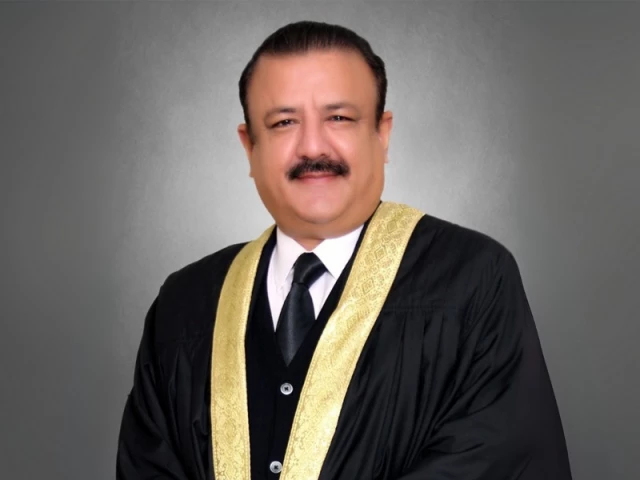SC sets aside order restraining IHC Judge Jahangiri
University of Karachi cancelled the judge's LLB degree in light of a previous decision of its syndicate

The Supreme Court on Tuesday set aside an Islamabad High Court (IHC) interim order that had restrained Justice Tariq Mehmood Jahangiri from performing judicial work.
On Tuesday, a constitutional bench (CB) of the SC — headed by Justice Aminuddin Khan and comprising Justice Jamal Khan Mandokhail, Justice Muhammad Ali Mazhar, Justice Hasan Azhar Rizvi, and Justice Shahid Bilal Hassan — resumed hearing Justice Jahangiri's petition.
An IHC division bench led by Chief Justice Sardar Muhammad Sarfraz Dogar on September 16 stopped Justice Jahangiri from performing his duties as it began proceedings on a quo warranto petition accusing him of holding a dubious LLB degree.
On September 19, five IHC judges, including Justice Jahangiri, went to the Supreme Court in person to file separate constitutional petitions, making eleven different prayers, including one seeking the quashing of the IHC order barring Jahangiri from judicial work.
However, on September 25, the University of Karachi cancelled the judge's LLB degree in light of a previous decision of its syndicate, further complicating the situation.
During proceedings on Tuesday, Attorney General for Pakistan (AGP) Mansoor Usman Awan appeared before the bench and argued that a judge cannot be barred from judicial work through an interim order.
Justice Aminuddin Khan asked the petitioner, Mian Dawood Advocate, for his view. Dawood agreed with the AGP, saying that in his opinion too, a judge cannot be restrained from performing judicial duties by way of an interim order.
Munir A Malik, Justice Jahangiri's counsel, while advancing arguments, referred to a previous CB order, noting that it had only stated that the writ petition was maintainable. He argued that, in his view, only the Supreme Judicial Council (SJC) has the authority to proceed against a judge.
He added that the Malik Asad Ali case did not hold that such writs were maintainable in the high court, and care must be taken not to give the impression that the SC had endorsed the maintainability of writs in this context.
Justice Aminuddin Khan remarked that the SC order only reproduced the language of the Malik Asad Ali case. Justice Jamal Khan Mandokhail noted that the court had previously held that only the SJC could remove a judge.
Justice Muhammad Ali Mazhar said the court was not touching upon the maintainability of a writ of quo warranto in this matter. "We have not said anywhere that the writ is maintainable before the high court. It is for the IHC to decide whether the petition filed there is maintainable or not."
He further noted that the registrar office's objections on the quo warranto petition against Justice Jahangiri are still pending, and the only question before the SC was whether a judge could be stopped from working through an interim order.
Justice Mandokhail observed that arguments in the IHC writ petition claimed that SC and high court judges come under the service of Pakistan and are not public office holderspoints that may be debated when the IHC hears the case on merit.
"In the present case, we deliberately do not wish to go into the merits," he added.




















COMMENTS
Comments are moderated and generally will be posted if they are on-topic and not abusive.
For more information, please see our Comments FAQ